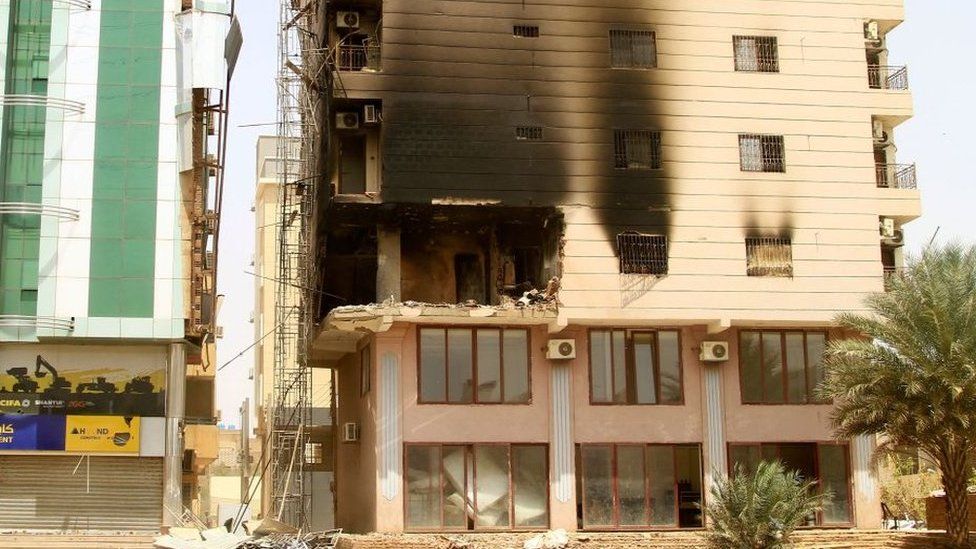ARTICLE AD BOX
 Image source, Getty Images
Image source, Getty Images
These buildings were damaged in the southern part of Khartoum during the escalating violence
By Emily McGarvey
BBC News
Foreign Secretary James Cleverly has warned that UK help for Britons stuck in Sudan will remain "severely limited" until a ceasefire is reached.
British diplomats and their families had been evacuated from Sudan in a "complex and rapid" operation.
However, some Britons still in the country said they feel abandoned by the UK government.
Violence in Sudan between two opposing forces has seen deadly shooting and shelling in the capital, Khartoum.
Mr Cleverly said there were "specific threats and violence directed towards diplomats" which led to the decision to evacuate staff.
He said the UK government remained "absolutely committed to supporting" Britons in Sudan but added that without an end to the fighting, ministers were "severely limited in our ability to provide assistance to British nationals".
Prime Minister Rishi Sunak also said work was continuing to ensure the safety of British nationals who remain in the country.
The power struggle that erupted last week between Sudan's regular army and a paramilitary force called the Rapid Support Forces (RSF) has also affected other parts of the country, leading to a growing humanitarian crisis.
Electricity is scarce and food and water supplies are running out for many.
Mr Sunak and Egyptian President Abdel Fattah al-Sisi agreed on Sunday that the UK and Egypt would work with international partners on diplomatic efforts to secure a ceasefire.
Tobias Ellwood MP, chair of the Commons defence select committee, said the PM should now focus on "phase two" of evacuations to ensure that all British passport holders who want to leave the country can be extracted.
He does not know how many British passport holders there are in Sudan, but he told the BBC he understands that more than 1,000 people have registered with the Foreign Office and there are "easily a couple more thousand" more who have not yet come forward.
Asked about criticisms that the UK had not acted quickly enough to evacuate British diplomats and their families, Mr Ellwood said over 1,000 military personnel had been mobilised at very short notice.
Defence Secretary Ben Wallace told the BBC that the British Army, Royal Navy and the RAF had been involved, with C-130 Hercules and A400 Airbus aircraft used in the weekend rescue.
Watch: British diplomats evacuated after specific threats in Sudan - UK Foreign Sec
On Sunday Mr Cleverly chaired a sixth Cobra session - an emergency response committee made up of ministers, civil servants and others - to discuss Sudan's "escalation" of violence.
Sam, a British businessman living in Sudan, told the BBC that news of the UK evacuation at the weekend "gave us hope, but in the absence of any information from the government this was clearly a solution for diplomats only".
He described the situation as a "nightmare for those of us left behind", and said he knew of many people from other countries like Hungary and South Africa whose embassies are making plans to evacuate nationals.
'A dicey situation'
Another UK citizen in Sudan, William, described a chaotic situation as he opted to leave the capital Khartoum on a bus, organised by his Sudanese employer to take him and other nationals to Egypt.
Speaking to the BBC's Newshour, he said the UK government had given him "nothing" in terms of support, adding: "We had to basically go private, we've had absolutely nothing but nonsense from the government and not even nonsense. We've had nothing.
"The internet's just gone out, so we've been on 3G all day. And we were all running out of data. And so communication was becoming increasingly difficult."
William described waiting to be collected by the bus as a "dicey situation" with "gunfire going off all the time".
"We're making quite slow progress but steady progress. So the idea is we continue going for the next two days, up to the Egyptian border, and then we're sort of safe."
UK citizens in Sudan are being urged to tell the Foreign Office where they are in case more help becomes available, and a hotline has been set up for those who need urgent help.
Several other countries including France, Germany, Italy and Spain have been evacuating their diplomats and citizens.
US authorities said they had airlifted fewer than 100 people with three Chinook helicopters on Sunday in a "fast and clean" operation.
The US embassy in Khartoum is now closed, and a tweet on its official feed says it is not safe enough for the government to evacuate private US citizens.
How have you been affected by what's happening in Sudan? You can get in touch by emailing haveyoursay@bbc.co.uk.
Please include a contact number if you are willing to speak to a BBC journalist. You can also get in touch in the following ways:
If you are reading this page and can't see the form you will need to visit the mobile version of the BBC website to submit your question or comment or you can email us at HaveYourSay@bbc.co.uk. Please include your name, age and location with any submission.

 1 year ago
16
1 year ago
16








 English (US)
English (US)